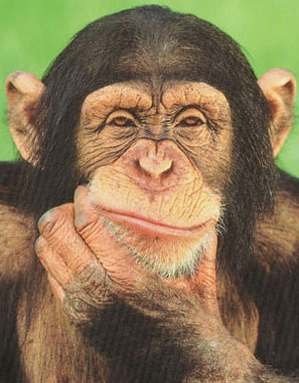About the ability to reason in other animals
"Very close to the ridicule of denying an obvious truth is to take the greatest works to defend it, and no truth seems more obvious to me than that the [other] animals are endowed with thought and reason just as men. The arguments are in this case so obvious, that they never escape the attention of the most stupid and ignorant. "
~ David Hume

Very often non-human animals are referred to colloquially as irrational animals and human animals are called rational animals. Even among philosophers and scientists, the ability to reason in nonhuman individuals has been dogmatically denied.
Other animals do not lack reasoning ability or are guided only by instinct. Other animals also think and reason, because they have brains with neural structures that make it possible. If in fact they have a brain capable of performing cognitive functions, it is absurd to suppose that they do not think or reason.
We tend to think that evolutionary intelligence has a single pinnacle that is exclusively occupied by human beings. But it is another mistake. Evolutionary development is not like a pyramid that culminates in the human being, but rather resembles a tree with many different branches. As biologist Stephen Jay Gould points out:
"We encourage a seriously skewed account when we abandon the more recent history of the animals that grew first and we pretend that the little vertebrate twig can act as a substitute for all subsequent history. Moreover, the prejudice introduced thus is the worst and most damaging of all our conventional errors about the history of our planet: the arrogant notion that evolution has a predictable direction that leads to human life. "
That other animals also reason is a phenomenon that is more than proven, according to biology and ethology. The evidence of reasoning in other animals is overwhelming. To deny it is simply, as I pointed out before, an evident display of ignorance or anthropocentric fanaticism.
But for anyone with a thorough knowledge of biology and ethology, it is shocking to find people who question, or deny, that other animals possess intelligence. This denotes simply lack of knowledge, ignorance or simple denial of evidence, as we will see below. According to biologist Donald Griffin:
"Reasoning and animal consciousness have simply become the latest in the long list of supposedly exclusively human characteristics that must be admitted being more widely shared within the animal kingdom."
We find evidence about it everywhere. For example, a recent study has shown that baboons are able to make analogies. Likewise, fish, as social animals, use the behavior of others to improve their own decisions. Their survival depends largely on the estimates. For example, they probabilistically estimate if there is food in a place by what they see of that place and by how many animals are already heading there and to other places. Crows can understand elementary physical principles -such as Archimedes- provided they provide a benefit for their survival.
Luis Alonso points out in the magazine “Investigation & Ciencia”:
"With the same level of innovation in experimental design applied to other species, scientists could discover similar abilities in the species of all taxa. In recent years, researchers have begun to reveal the level of cognition of bears, which could rival that of the corvids, dolphins and primates. Research on insects, fish and octopuses has also provided a list of abilities that were supposed to be exclusive to primates, in terms of the use of tools, teaching, social learning, numerical computation, and so on. It could very well happen that what seems extraordinary in the skills of the dolphins is widespread throughout the animal kingdom.”
All the evidences point to the confirmation that the human being is not the only rational animal. We can find thousands of tests that confirm the rationality in other animals.
In fact, not only do we find evidence about his ability to think but also his level of reasoning is more complex than we suppose. This is how the researcher Joëlle Proust puts it:
"Animals are capable of generating concepts and form their mental representations since they have the ability to obtain information about the relationships that occur in their environment, to memorize them and to separate them from the perception of objects and external events."
On the other hand, despite what is commonly believed, intelligence has nothing to do with the size of the brain. For example, bees are tiny in size, compared to us, and have been proven to be very complex animals.
Anyway, I think it is very important to point out that the motive for respecting someone morally is not in the fact that he reasons but in the fact that he can feel.
What is relevant regarding moral consideration is not whether an individual can speak or reason, nor their level of intelligence; The important thing is if you can feel. And it is a fact that, like us, other animals feel.
That is why intelligence can never be justified as an excuse to exclude or demean someone within the moral community, as explained by Gary L. Francione:
"There is no reason to justify that cognitive abilities or the level of intelligence have any relation to the criterion of moral consideration. Why, for example, the ability to add and subtract should have some relation to the consideration and moral respect that everyone deserves for himself? I do not see her. Why would someone with an IQ of 180 deserve more respect, in ethical terms, than someone who has 50? There is no reason to morally justify it. Intelligence does not affect the relevant fact of being able to feel. To experience pain or pleasure. To have basic interests, such as the desire to live, to continue existing, and to avoid harm. "